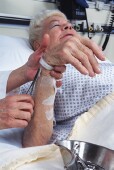- Could Your Grocery Store Meat Be Causing Recurring UTIs?
- Are You Making This Expensive Thermostat Error This Winter?
- Recognizing the Signs of Hypothyroidism
- 10 Strategies to Overcome Insomnia
- Could Artificial Sweeteners Be Aging the Brain Faster?
- Techniques for Soothing Your Nervous System
- Does the Water in Your House Smell Funny? Here’s Why
- Can a Daily Dose of Apple Cider Vinegar Actually Aid Weight Loss?
- 6 Health Beverages That Can Actually Spike Your Blood Sugar
- Treatment Options for Social Anxiety Disorder
Cancer, Heart Disease Not Likely Killers of Those Over 100


Pneumonia and frailty are more likely to be the cause of death among people aged 100 and older, rather than chronic conditions such as cancer or heart disease, new research shows.
The findings are based on data on centenarian deaths in England between 2001 and 2010.
Worldwide, the number of centenarians is expected to reach 3.2 million by 2050. According to a report from the U.S. Census Bureau, there were more than 53,000 people aged 100 or above in the United States in 2010, with the number slowly rising over time.
The new study of British centenarians included almost 36,000 people, 87 percent of them women, with a median age of 101 at the time of death. The number of deaths for people age 100 or more in England rose by 56 percent over 10 years, from 2,823 in 2001 to 4,393 in 2010.
According to the study, these very old individuals were most likely to die in a nursing home (61 percent) or a hospital (27 percent) than at home (10 percent) or in hospice care (0.2 percent). The percentage of centenarians who died in the hospital changed little during the study period, despite the growing number of people 100 and older.
The rising number of people over 100 years of age, and the need to care for them, “indicates an urgent need to ensure adequate long-term care and responsive community care services to support people living with extreme longevity,” wrote palliative care researcher Catherine Evans and colleagues from King’s College London.
The study was published online June 3 in the journal PLoS Medicine.
According to the researchers, the new study shows that many centenarians have an “increased likelihood to ‘acute’ decline, notably from pneumonia.” More must be done, as well, to help the very old “remain in their usual residence, [while] increasing [nursing] home bed capacity,” they concluded.
More information
The American Academy of Family Physicians outlines good health habits for people 60 and older.
Source: HealthDay
Copyright © 2026 HealthDay. All rights reserved.










